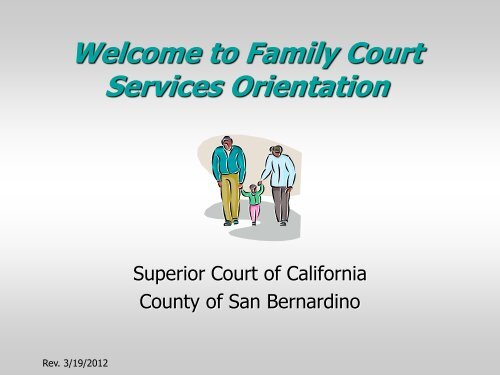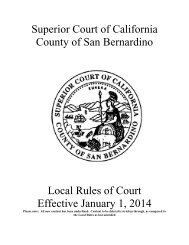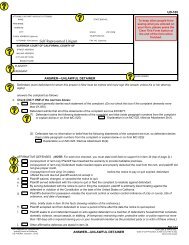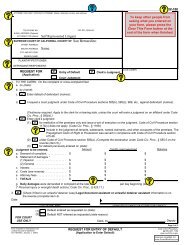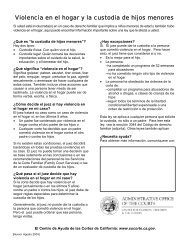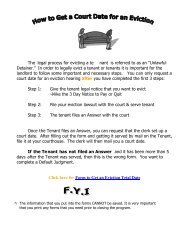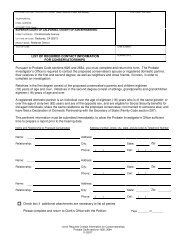Online Orientation - San Bernardino Superior Court
Online Orientation - San Bernardino Superior Court
Online Orientation - San Bernardino Superior Court
You also want an ePaper? Increase the reach of your titles
YUMPU automatically turns print PDFs into web optimized ePapers that Google loves.
Welcome to Family <strong>Court</strong><br />
Services <strong>Orientation</strong><br />
<strong>Superior</strong> <strong>Court</strong> of California<br />
County of <strong>San</strong> <strong>Bernardino</strong><br />
Rev. 3/19/2012
Parent <strong>Orientation</strong> Instructions<br />
Please read all slides in preparation for your<br />
child custody recommending counseling<br />
appointment. This presentation is required prior<br />
to your session.<br />
IMPORTANT NOTE<br />
You will be given instructions at the end of this<br />
presentation on how to print your certificate.<br />
Please bring the certificate to your session.
This Presentation<br />
• We designed this presentation to help prepare<br />
you for your child custody recommending<br />
counseling session and for your appointment to<br />
be a productive and positive experience<br />
• Section 1:Emotional issues for parents and children<br />
• Section 2:General information about child custody<br />
recommending counseling<br />
• Section 3:Custody & parenting plan terminology<br />
• Section 4: Frequently Asked Questions
THE COMMON GROUND IS YOUR<br />
CHILDREN<br />
YOU BOTH LOVE YOUR CHILDREN<br />
and<br />
YOUR CHILDREN LOVE BOTH OF YOU<br />
KEEP THIS IN MIND WHEN YOU ATTEND YOUR SESSION
Part 1<br />
Emotional Issues<br />
• Separation is a grief process<br />
• Parents who were together experience loss of<br />
their relationship/ marriage<br />
• Parents who were never together experience<br />
loss of freedom, of choice, of exclusive<br />
relationship with child<br />
• Loss of the dream of the perfect partner and<br />
perfect childhood for your child
5 Stages of Grief<br />
• Denial (This can’t be happening to me)<br />
• Anger (That #$@! can’t do this to me. Feelings<br />
of hurt, pain turns into anger toward the other<br />
parent. A desire for revenge)<br />
• Bargaining (If only…Trying to make a deal with<br />
yourself or the other parent to get what you<br />
want)<br />
• Sadness /depression (I will never be happy<br />
again)<br />
• Acceptance (Moving on with your life) Having a<br />
balanced and positive view of the other parent
• Fiery Foes<br />
Types of relationships post<br />
separation or divorce<br />
• Low interaction, low-to-no communication, extreme conflict,<br />
highly litigious<br />
• Angry Associates<br />
• Moderate interaction, low communication, some conflict, tense<br />
and hostile, blaming, badmouthing<br />
• Cooperative Colleagues<br />
• Moderate interaction, good communication, parents are a team,<br />
respectful, get along for sake of children<br />
• Perfect Pals<br />
• High interaction, high communication, spend time together<br />
(holidays), friends with one another
Children and Divorce<br />
• Children experience anxiety and insecurity<br />
during their parents separation. Expect some<br />
behavior changes in your child.<br />
• The first year following the separation is a<br />
critical time for kids. Parents may be more<br />
distracted given their own feelings about the<br />
separation.<br />
• Routines may be disrupted.<br />
• Everyone, including the kids are struggling to<br />
find balance and stability.
Parental Cooperation<br />
• Children’s adjustment to their parents separation is<br />
related to their parents ability to cooperate with one<br />
another.<br />
• Reassure your kids that they will have an on-going<br />
relationship with both parents. You are separating from<br />
the other parent. Your child is not.<br />
• Children exposed to their parents conflicts have more<br />
emotional, behavioral and school problems than kids<br />
who are sheltered from their parents fights.<br />
• Do not share every terrible detail about the problems<br />
between you and the other parent. Keep them out of the<br />
conflict.
Part 2<br />
General Information<br />
• In the next section, we will cover<br />
information about the details of child<br />
custody recommending counseling and<br />
tips for getting the most from your<br />
session.
Who Attends<br />
<br />
<br />
<br />
<br />
Both parents must be present for child<br />
custody recommending counseling to<br />
occur<br />
The counselor who is either a licensed<br />
marriage, family therapist or a licensed<br />
clinical social worker<br />
An Interpreter (if needed)<br />
Guardians (Guardianship cases only)<br />
Who does not Attend<br />
The Judge<br />
Attorneys<br />
Stepparents<br />
Significant Others<br />
Relatives<br />
Friends<br />
Children
Where will child custody<br />
recommending counseling be held<br />
• At the Family <strong>Court</strong> Services office in the<br />
courthouse where your case is being heard.<br />
The locations are:<br />
• <strong>San</strong> <strong>Bernardino</strong>-351 N. Arrowhead Ave,<br />
Room 200<br />
• Rancho Cucamonga- 8303 Haven Ave<br />
• Victorville-14455 Civic Drive<br />
• Joshua Tree- 6527 White Feather Rd<br />
• Barstow- 235 East Mountain View Ave
When does child custody<br />
recommending counseling occur<br />
<br />
<br />
<br />
<br />
<br />
Appointments are held at 8am, 10am or 1pm<br />
Your appointment may last up to 2 hours<br />
Please have your questionnaire completed before you<br />
arrive for your appointment<br />
Please try to arrive early because sometimes, there are<br />
long lines to enter the courthouse.<br />
Both parents must attend for the appointment to occur.<br />
The only exception is if one parent has been authorized<br />
by Family <strong>Court</strong> Services or the <strong>Court</strong> to participate by<br />
phone (reside out of state or country, incarcerated, in<br />
military)
Why Child Custody recommending<br />
Counseling<br />
• California law requires parents who are unable to agree<br />
on a parenting plan to attend child custody<br />
recommending counseling before their court hearing to<br />
try to reach an agreement<br />
• This appointment gives parents an opportunity to resolve<br />
disagreements regarding the children.<br />
• Parents normally feel better about how they share the<br />
time with the children when they have input into the<br />
decision-making process<br />
14
Goals of child custody<br />
recommending counseling<br />
Child custody recommending counseling is<br />
mandatory and it<br />
• Provides an opportunity, before your court<br />
hearing, to reach an agreement regarding<br />
custody and a parenting plan.<br />
• May assist in improving communication<br />
between parents.<br />
• May help reduce anger and resentment<br />
between parents.
What is child custody<br />
recommending counseling<br />
Child custody recommending counseling is about<br />
finding a solution that works for everyone; you, the<br />
other parent and the children that protects the<br />
safety, health and welfare of the children.<br />
You may need to compromise to find a solution. In<br />
order to reach an agreement, you must be willing to<br />
negotiate.<br />
Child custody recommending counseling can assist<br />
parents in developing a plan that ensures the<br />
children have a relationship with both parents.<br />
It is not about “winning” or “losing”
Expectations during the session<br />
<br />
<br />
<br />
<br />
<br />
<br />
<br />
<br />
<br />
Be respectful of one another<br />
Do not interrupt or insult the<br />
other parent<br />
Do not intimidate or threaten<br />
the other parent<br />
Focus on the children’s needs<br />
Listen as much as you talk<br />
Stay on the subject<br />
Share any concerns about the<br />
other parent or your children<br />
State preferences for sharing<br />
time with your children<br />
Determine a parenting plan
Best interest of the children<br />
The safety, health and welfare of your children is the<br />
counselor’s primary focus<br />
These safety issues include:<br />
Substance Abuse<br />
Child Abuse<br />
Domestic Violence<br />
Relevant criminal history<br />
If there are no safety or risk factors, then frequent and<br />
continuing contact with both parents is best for the children<br />
The counselor is mandated by law to make a suspected child abuse<br />
report to the Department of Children’s Services if the parents or<br />
children disclose actual or suspected child abuse or neglect.
Children Interviews<br />
Please do not bring your children to<br />
the appointment.<br />
‣ Typically children will be interviewed between<br />
the ages of 5 and 18<br />
‣ Children may be interviewed when requested<br />
by the counselor or ordered by the court<br />
‣ Children interviews occur after school when<br />
possible<br />
‣ Your children will meet individually with the<br />
child custody recommending counselor.<br />
‣ Parents do not participate in the interview
What is Domestic Violence<br />
Domestic violence may occur in many forms between two<br />
people in an intimate relationship.<br />
• Physical abuse (punching, choking, slapping)<br />
• Sexual abuse (rape, other non-consensual sex)<br />
• Emotional & mental abuse (yelling, cursing)<br />
• Stalking<br />
• Threats & coercion, intimidation<br />
• Harassment<br />
• Isolation (preventing from leaving house or making calls)<br />
• Economic abuse (limiting access to money)<br />
• Power and control
Effects of Domestic Violence on<br />
Children<br />
Emotional impact<br />
• Depression and anxiety<br />
• Feelings of fear and helplessness<br />
• Fear of parental loss and abandonment<br />
Behavioral impact<br />
• Alcohol and drug abuse<br />
• Aggression or violence<br />
• School problems
Domestic Violence Victim Rights<br />
• If there is Restraining order or Declaration of<br />
domestic violence, you have the right to have<br />
• Separate mediation (separate times, separate days)<br />
• A support person present in mediation for<br />
emotional support<br />
• Appointment time is kept confidential<br />
• Address and telephone number is kept confidential
Supervised Visits<br />
• The court may order supervised visitation to<br />
ensure the safety, health & welfare of the children<br />
when<br />
• There are issues of substance abuse, child<br />
abuse, domestic violence or relevant criminal<br />
history that effects a child’s safety<br />
• There has been no contact by one parent with<br />
the children for an extended period of time<br />
• Significant parent-child relationship problems
Supervised Visits<br />
• Who may supervise the visits<br />
• A family member or friend over the age of 18 that both<br />
parents agree to<br />
• A professional monitor may be ordered by the court if<br />
deemed necessary due to severe risk factors of one<br />
parent. There is a fee for this service that the parent<br />
being supervised is responsible to pay<br />
• Supervised visits are usually temporary<br />
• The court may review the matter and determine when<br />
unsupervised visits are appropriate
Part 3<br />
Important Terms to Know<br />
• There are some terms which are helpful to<br />
know as you go through this legal process.<br />
These include:<br />
• Custody: Legal & Physical<br />
• The Parenting Plan<br />
• Types of agreements<br />
• Types of recommendations
Legal Custody<br />
Legal custody pertains to decision-making abilities as<br />
well as having access to certain information<br />
concerning your child’s health, welfare and education.<br />
• Joint legal custody: Both parents share in<br />
decision-making and have access to child’s<br />
legal information.<br />
• Sole legal custody: One parent makes all<br />
legal decisions.<br />
It is common for parents to share joint legal custody.
Common Legal Decisions<br />
• HEALTH DECISIONS:<br />
• Medical records<br />
• Treatment options such as medications, surgery, etc.<br />
• Doctor / Dentist / Orthodontist appointments & info<br />
• Mental health information<br />
• EDUCATIONAL DECISIONS:<br />
• Public education, Private schools, home schooling<br />
• Tutoring<br />
• Report cards / test results<br />
• After school sports / other activities<br />
• Conferences / field trips<br />
• WELFARE DECISIONS:<br />
• Residence / change of residence<br />
• Day care<br />
• Religious training<br />
• Significant alteration of child’s appearance (hair color, tattoos, etc.)<br />
• Special needs
Physical Custody<br />
Physical custody pertains to the time your<br />
child spends with each of his/her parents.<br />
• Joint physical custody: Children spend a<br />
significant amount of time with both<br />
parents. (not necessarily equal time)<br />
• Sole physical custody: Children live<br />
primarily with one parent.
What is a Parenting Plan?<br />
A written plan between the parents regarding:<br />
• Time with the children<br />
Weekdays<br />
Weekends<br />
Holidays<br />
Birthdays<br />
School Breaks<br />
Vacations<br />
• Each parent’s responsibilities<br />
Transportation<br />
Extracurricular activities<br />
School work<br />
Child care<br />
Modifications to the plan may be by mutual parental<br />
agreement or court order
Sample Parenting Plans<br />
These are plans that have worked for some<br />
families.<br />
You need to tailor your parenting plan to fit your<br />
children’s needs<br />
• Weekday Sharing Weekend Sharing<br />
• One specific weekday, after school – 8pm Alternate weekends<br />
• Several specific weekdays, 5pm – 8pm 1st, 3rd, & 5th weekends<br />
• Every day after school – 8pm 2nd & 4th weekends<br />
• Weekday overnights Friday until Sunday or Monday<br />
• Wednesday after school – Thursday before school Saturday am until Sunday am<br />
• Wednesday after school – Friday before school Every weekend<br />
• Shared Weeks<br />
• Week to Week with exchanges on Friday, Sunday or Monday<br />
• Week to Week with midweek dinner visit or<br />
• overnight to non-custodial parent<br />
• Wednesday – Saturday & Saturday – Wednesday<br />
• 2 overnights on weekdays and alternate weekends<br />
• (Friday – Monday)
Factors to Consider When<br />
Developing a Parenting Plan<br />
<br />
<br />
<br />
<br />
<br />
<br />
<br />
<br />
<br />
<br />
<br />
<br />
<br />
Parent’s work schedules<br />
Distance between parent’s homes<br />
Children’s attachment with both parents and their siblings<br />
Parents’ strengths and weaknesses<br />
Children’s ages, developmental needs and temperament<br />
Children’s schooling, child care and extracurricular activities<br />
Children’s special needs<br />
Level of conflict between the parents<br />
Previous time share arrangements<br />
Safety concerns of either parent (substance abuse, child abuse)<br />
Stepfamily/Blended Family Issues<br />
- Children need to maintain their relationships with siblings<br />
Younger children do better with frequent visits with each parent<br />
Older children can manage longer durations with each parent
At the Conclusion of your Session<br />
<br />
The child custody recommending counselor will write a<br />
report advising the <strong>Court</strong> of the session outcome<br />
Agreement<br />
‣ Temporary agreement - The parents agree to a<br />
parenting plan on a short term basis with the<br />
counselor and/or parents requesting a review and<br />
further sessions.<br />
‣ Partial agreement - The parents agree on some<br />
issues. The counselor will make recommendations<br />
on the issues of disagreement.<br />
‣ Full agreement - The parents agree on all issues<br />
related to their parenting plan.<br />
No agreement The parents do not agree on a<br />
parenting plan and other areas of disagreement. The<br />
counselor will submit a report with recommendations<br />
on the issues of disagreement
Types of Recommendations<br />
<br />
<br />
<br />
<br />
<br />
<br />
<br />
<br />
<br />
<br />
<br />
Legal Custody<br />
Physical Custody<br />
Parenting plan(time children are shared between the<br />
parents)<br />
Individual counseling for children and parents<br />
Conjoint sessions between one or both parents and<br />
children<br />
Drug/Alcohol Treatment<br />
Anger Management Classes<br />
Co-parenting Program<br />
Parenting Classes<br />
Psychological Evaluation<br />
<strong>Court</strong> review and further mediation<br />
***REMEMBER: the Judge makes the final decision.
Ex-Parte Communication<br />
Ex-parte (one-sided) communication is<br />
not allowed.<br />
Once your session is finished, you may not<br />
talk any further to the counselor about<br />
your case.<br />
It is important that you say everything you<br />
need to say during your session.<br />
If you remember something that you<br />
forgot to discuss in your session, please<br />
tell the Judge at your court hearing.
Reminders<br />
CHILDREN DO BEST WHEN:<br />
• There is no violence or conflict<br />
between parents<br />
• Both parents remain actively<br />
involved<br />
• Parents co-parent together<br />
(unless there has been<br />
domestic violence or high<br />
conflict)<br />
• They are not burdened with<br />
making a choice of where to<br />
live<br />
PARENTS DO BEST WHEN:<br />
• They develop their own<br />
parenting plan, rather than<br />
follow a court ordered<br />
plan…and, parents are more<br />
likely to follow their own<br />
agreement!<br />
• They work through their<br />
feelings about the other parent,<br />
rather than use the children to<br />
hurt each other
WHAT I NEED - A Child’s Voice<br />
I need to love many people, including my stepparents and relatives,<br />
without guilt or being made to feel disloyal. The more love I give, the<br />
more I have to give and the more love I will receive.<br />
I need to have a regular daily and weekly routine, one that is not filled<br />
with alternating patterns and disruption.<br />
I need to spend time with both of my parents, regardless of grown-up<br />
wants and wishes regarding convenience, money, or their feelings.<br />
I need to be able to express my feelings.<br />
I need to be able to love both of my parents since they are both a part<br />
of me and to be reassured that this is okay.<br />
I need to not have to blame or choose sides.<br />
I need to not have to make adult decisions.<br />
I need to be a child and not assume my parent’s duties or be an adult<br />
companion, friend, or comforter to my parents.<br />
I need to never have to choose which parent to live with. This is a<br />
decision for adults. Having to make such a choice will always hurt<br />
someone else, and therefore, hurt myself. I may feel this way even as a<br />
teenager and people wish I were able to make the decision.<br />
I can never choose between my parents.<br />
Author Unknown
Part 4<br />
Frequently asked questions<br />
Does the other parent need to go to<br />
orientation?<br />
• Yes. The <strong>Court</strong> expects both parents to<br />
attend orientation. You only need to attend<br />
the class one time.
What happens if the other parent<br />
does not come to the child custody<br />
recommending counseling session?<br />
• The <strong>Court</strong> is advised when a parent<br />
does not attend their appointment.<br />
Sometimes, the <strong>Court</strong> will refer the parents<br />
back to Family <strong>Court</strong> Services.
What if the other parent does<br />
not go to the court hearing?<br />
• The judge will either make an order<br />
regarding custody & visitation or set<br />
another court hearing.
Do I need an attorney if the other<br />
parent has one?<br />
• Not necessarily. Many parents successfully<br />
represent themselves in custody matters.<br />
Attorneys can be especially helpful when<br />
there are complex matters.<br />
Whether or not you hire an attorney is<br />
your decision
Can I bring my boyfriend or girlfriend<br />
to my appointment or to court?<br />
• Only the parents attend the child custody<br />
recommending counseling session unless<br />
the <strong>Court</strong> orders other persons to participate<br />
Do not bring any third parties to the session.<br />
Anyone may attend or observe the court hearing
What if the other parent does not<br />
follow the court order?<br />
• You can ask a law enforcement agency<br />
to enforce the order, or you can file a<br />
motion requesting to change the order<br />
• Please do not call the child custody<br />
recommending counselor if the other<br />
parent is not complying with the court<br />
order
What if the other parent does not<br />
return my child from a visit?<br />
• Notify the police. Please do not call<br />
the child custody recommending<br />
counselor.
Who pays the transportation costs when<br />
there is a great distance between the<br />
parents’ homes?<br />
• The Judge makes all decisions regarding<br />
money and expenses
What type of paperwork may I bring to<br />
the child custody counseling session?<br />
Bring documents pertinent to your children’s<br />
health & safety and your school or work schedule<br />
such as:<br />
•School attendance reports, progress reports,<br />
report cards<br />
•Letters from therapists<br />
•Police reports<br />
•Your school and work schedule<br />
Note: a copy of any paperwork you provide will be given<br />
to the other parent
Do we have to come back to court to<br />
change our court ordered parenting<br />
plan?<br />
• Some parents who have a cooperative<br />
relationship make changes to the<br />
parenting plan without returning to court<br />
• Other parents who do not have a<br />
cooperative relationship make changes to<br />
the parenting plan by returning to court to<br />
legally change the orders<br />
• Parents must decide if they want their<br />
changes to the parenting plan made legal<br />
by court order
What if the other parent is speaking<br />
badly about me to the children?<br />
• It is damaging to children when parents<br />
say negative and derogatory comments<br />
about the other parent.<br />
• It may affect your child’s self-esteem<br />
• It may affect your relationship with your<br />
child
Does the judge ever order that one<br />
parent cannot see the child?<br />
• Rarely. In extreme cases, the court may<br />
order that there be no visitation if it is<br />
determined necessary to protect the<br />
safety and welfare of the child.
How does the child custody order<br />
affect the amount of child support?<br />
• Many factors are considered when<br />
calculating child support, including<br />
parent’s income and the amount of time<br />
with the child.
If the other parent has a restraining<br />
order against me, can I still see my<br />
children?<br />
• The court may order visitation, but if<br />
the children are named as protective<br />
persons, the court may stop visitation or<br />
require supervised visitation.
How long is the child custody<br />
recommending session session?<br />
• Times can vary depending on the<br />
complexity of the case, but plan to spend<br />
up to 2 hours. If you have an agreement,<br />
the session will be brief.
Good luck<br />
You have completed the online orientation<br />
to Family <strong>Court</strong> Services.<br />
We wish you and the other parent the best<br />
in your co-parenting efforts.<br />
Remember<br />
This isn’t about winning or losing<br />
Child custody recommending counseling is<br />
about finding a solution that works for<br />
everyone, especially the children.
Certificate of Completion<br />
You have completed the online<br />
orientation to Family <strong>Court</strong> Services.<br />
Please print the certificate on the next<br />
page and bring it to your appointment<br />
as proof that you have completed the<br />
course.<br />
Proceed to the next page and click on<br />
“print the certificate”.
Certificate of Completion<br />
You have completed the online<br />
orientation to Family <strong>Court</strong> Services.<br />
54


